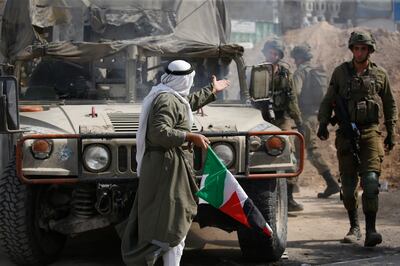Etaf Rum’s 2019 debut novel, A Woman Is No Man, was a searing portrait of three generations of Palestinian-American women living in Brooklyn. Both readers and critics were gripped by Rum’s depiction of her characters’ struggles within an oppressive and rigidly-controlled community and their efforts to find the strength to speak out and make their voices heard.
The author intended to write what she calls “an Arab American story”. The end result was an impressive, insightful work which confronted stereotypes, examined patriarchal power and illuminated cultural clashes.
Four years on from her debut and Rum has written a bold and immersive second novel, Evil Eye.
“With Evil Eye, I wanted to tell the story of a Palestinian-American woman whose ambition conflicts with family responsibility, who struggles with identity and belonging and who needs to unpack childhood trauma – as well as challenge a limiting inner voice – in order to find her own way and eventually break free,” Rum explains.

Rum, who was born and raised in Brooklyn by Palestinian immigrants, draws on her own personal experiences.
“I wanted to explore the ways in which some conservative parts of Arab culture need to be questioned,” she says of her first book.
“These include discouraging individuals from challenging traditional beliefs, raising sons and daughters differently, not taking mental health seriously, discouraging independence in young adults, especially females and enforcing gender norms.”
Rum’s upbringing was very conservative and strict. Like some of her characters, she was not allowed to attend public school in case the values her parents had instilled in her became tainted. Even mixing with Americans was forbidden.
“It was slightly frustrating as a kid, but I accepted this as the norm,” Rum says. “I did not consider myself to be American because our Arab culture and values growing up – which prioritised family ties, self-respect, and a strong emphasis on modesty and traditional beliefs and rituals – were so different from the individualistic and self-serving nature of Western culture.”
After Rum got married, moved to North Carolina and started a family, she vowed to follow a different path from her mother and get an education. She made up for lost time by studying hard and eventually acquiring three university degrees.
For a while, Rum taught and harboured no grand plans to write. “I decided I wanted to be a writer quite by accident,” she says. “I chose a career in teaching because I believed it was more acceptable and appropriate as a mother – one of many limiting beliefs from my upbringing.

“After exploring the ways in which these beliefs were hindering my growth and fulfilment through writing, I decided, seemingly overnight, that I wanted to write fiction about it.
“It wasn’t hard to get published,” she adds, “but maybe it only felt that way because my life experiences in comparison were much more difficult.”
As with its predecessor, Evil Eye contains autobiographical elements.
Yara is a Palestinian-American woman who is still haunted by memories of feeling “disconnected, unseen, alone” while growing up in Brooklyn. Now she is settled in North Carolina with her husband Fadi and their two daughters, and has a couple of degrees under her belt and a job at a local college.
“You’re one of the most independent Arab women I know,” Fadi tells her. However, this independent woman is also an unhappy one. To get to the root of her problems, she is forced to embark on a journey of self-discovery and confront her painful past.
Yara’s life overlaps often with that of her creator. Rum says she was never tempted to swap fiction for fact and write a straight memoir instead.

“I don’t think I have the courage to write one. Fiction felt like the safer route. Fiction also tested my imagination and allowed me to create scenes with more flexibility as well as advance the storyline in a more riveting way.”
In Rum’s debut, the heroine Deya feels neither American nor Arab. In Evil Eye, Yara is plagued by “this sense that she belonged nowhere”. It’s a feeling that Rum knows only too well.
“My displacement as a Palestinian raised in America has definitely influenced my perception of the world and my place within it, including my inability to feel true connection and belonging to either culture,” she says.
“Like Yara, my sense of alienation was heightened when visiting Palestine and realising my immense privilege as an American in comparison to the poverty, occupation and injustices the Palestinian people suffer from.”
Fortunately, Rum has found a way of dealing with her cultural dislocation – and turning it to her advantage creatively. “Writing,” she says, “is how I make sense of myself and my place in the world.”






